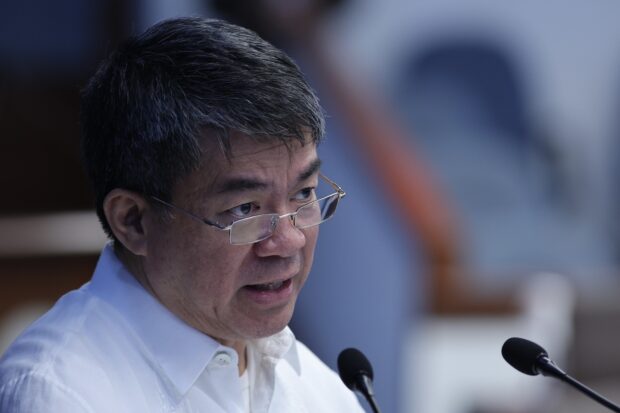
Senate Minority Leader Aquilino “Koko” Pimentel III (Joseph Vidal/Senate PRIB)
Sen. Aquilino “Koko” Pimentel III on Friday urged President Ferdinand Marcos Jr. to veto the bill creating the Maharlika Investment Fund (MIF) and send it back to Congress, saying the measure may have become too “disembodied” from what Mr. Marcos had originally intended for the fund.
The Senate minority leader skipped the actual voting on Senate Bill No. 2020 on Wednesday, May 31. Sen. Risa Hontiveros was the lone dissenter, Sen. Nancy Binay abstained, while Senators Francis Escudero and Imee Marcos were absent, like Pimentel.
The measure approved by the Senate was adopted hours later by members of the House of Representatives in the bicameral conference committee. The House approved its version of the bill, House Bill No. 6608, in December last year.
READ: Maharlika bill is ‘unsalvageable, beyond repair’ – Pimentel
Contradictory
Pimentel called on the President “to exercise his veto power,” saying all the modifications to what became the final measure may not be what Marcos had envisioned for the fund.
“What if [the President] didn’t get what he wanted? What came out of the legislative mill? Is it the same look and philosophy of the original certified bill?” Pimentel said when reached for comment.
“Didn’t all the prohibitions and the lifting of exemptions kill the raison d’etre of the fund? So why did they create a fund which they also disembodied?” he added.
READ: How did senators vote and eventually approve Maharlika bill?
Pimentel further argued that the MIF’s source of capitalization was spelled out in a contradictory provision in SB 2020. He noted that it excluded six state-owned financial institutions and pension funds—the Government Service Insurance System, Social Security System, Overseas Workers Welfare Administration, Philippine Veterans Affairs Office, Philippine Health Insurance Corp., and Home Mutual Development Fund—from mandatory contribution to the fund.
‘Opaque’
“Six (entities) are absolutely prohibited from investing in the Maharlika Investment Corp. (which will manage) the fund. Are the makers of the (MIF) ‘wary’ of the fund?” said Pimentel, who earlier opposed the original plan to include those government corporations and agencies.
READ: Pimentel on missing ‘Maharlika’ vote: Senate shouldn’t pass bills at an ungodly hour
Their exclusion makes for one of several “opaque provisions, contradictions, ambiguities and loopholes” in the final measure, he said.
Pimentel and other senators had earlier questioned the establishment of the MIC as a new government corporation, as well as the prescription period of 20 years for violations specified in the approved bill, such as graft and corruption, falsified audits and the appointment of officers to the MIC who are deemed unqualified due to pending cases and other factors.
Duterte’s veto
The senator said Marcos could exercise his veto power as his predecessor Rodrigo Duterte did in 2019, when he vetoed the security of tenure bill which Congress approved that year, though Duterte earlier certified it as urgent.
“By returning [the bill] to Congress, [we can] resolve conflicting provisions and add more safeguards to protect the funds and foster transparency and accountability,” Pimentel said.
He reiterated his readiness to help those planning to question the MIF bill before the Supreme Court.
READ: House ‘accepts’ Senate version of Maharlika bill
But another opposition lawmaker advised against taking the bill to the tribunal and instead recommended that Congress just amend or repeal the measure.
In a statement, Albay Rep. Edcel Lagman said he did “not see any constitutional infirmity in the MIF to merit the Supreme Court’s exercise of judicial review.”
“The remedy against an unwise or improvident law is to seek its amendment or repeal by the legislature itself,” said the congressman, one of six House members who voted against the bill.
According to Lagman, the high court had noted in a past ruling that the courts “do not involve themselves with or delve into the policy or wisdom of a statute.”
READ: SC unlikely to rule if Maharlika bill passes; Lagman won’t challenge
On that basis, he said, he is “dousing cold water on projected petitions to challenge the constitutionality of the MIF before the high court” after President Marcos signs it into law.
Lagman maintained, however, that the bill was “not … seasonable, as major negative economic indicators currently pummel the economy.”
“The projected P500 billion funding for the MIF could be put to better use as budgetary support to finance … basic socioeconomic services and infrastructure development,” Lagman said.
READ: ‘Unconstitutional’: Colmenares questions lighting-fast approval of ‘chaotic’ Maharlika bill
Sen. Mark Villar, principal sponsor of the Senate measure, said the chamber was able to address all legal issues and other concerns raised by critics, including questions regarding the authority of the MIC.
Senate President Juan Miguel Zubiri also defended the bill, saying that there were enough safeguards against corruption.“I’m sure [the MIF bill] can stand the test of judicial scrutiny by the Supreme Court,” Zubiri said.
Finance Secretary Benjamin Diokno, in his statement on Friday, defended the mandatory contribution of the Bangko Sentral ng Pilipinas (BSP) to the fund.
“The contributions being asked from BSP for the first two years of the MIF … are dividends declared in favor of the national government,” said Diokno, former BSP governor and a member of its Monetary Board as representative of the Executive department.
‘Quite good provisions’
The MIF’s authorized capital stock is P500 billion, but will start with an initial P125 billion—of which P50 billion will come from the national government through dividends from the BSP, P50 billion from Land Bank of the Philippines and P25 billion from Development Bank of the Philippines.
READ: SC seen as next arena for ‘Maharlika’ critics
Socioeconomic Planning Secretary Arsenio Balisacan said the final bill had, “in general, quite good provisions, especially those that improve the governance of Maharlika, the safeguards and so on.”
“Those are very useful, at least from my point of view, in clarifying what cannot be used and what can be used,” he said at a press briefing on Friday.